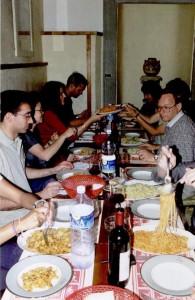 All over the world the main features of the stereotyped Italian do not normally correspond to those of a polite and well-mannered person: Italian people are rather “renowned” for speaking loudly, for trying to skip a queue, for driving erratically and so on. However they do have their own good and sometimes odd manners, which they are attached to, and whose respect they rarely disregard. Let’s examine “fare i complimenti”: its first meaning is the same as in English (to make compliments), but it has a second and more subtle meaning, which could be translated with “to make manners”, but which can be better explained by some examples. So, if an acquaintance of yours (not an intimate friend) invites you for dinner at his or her place, the correct answer should not be: “sì, grazie”, but on the contrary something like: “no, dai, sarebbe troppo disturbo per te” (no, thanks, that would be too much trouble for you). The other person is then supposed to insist and only at this time you should accept the invitation. While having dinner, if the landlady asks you whether you want some more pasta or wine, you are supposed to say: “no grazie”. Your kind refusal will allow the host to repeat his or her offer, after which you can decide to accept it or not. It is a very theatrical play, typical of other mediterranean country. Its plot can change according to the context or be subject to slight variations following the “actors”. It can also be considered somewhat two-faced (why to say no if you mean to say yes) and make you feel unease if you are not used to it. None the less it is part of Italian good manners and it must be noted that the more southwards in the country you go, the more rooted this tradition is. There is just one thing you should never refuse when you happen to call in an Italian home: a cup of espresso! unless you want to be considered unsociable… If you do not like coffee then you would better decline the offer by pretending that you have already drunk too many cups. A useful sentence in this case might be: “No grazie, ma ne ho già bevuti 4 oggi” (no thanks, but I have already had 4 today).
All over the world the main features of the stereotyped Italian do not normally correspond to those of a polite and well-mannered person: Italian people are rather “renowned” for speaking loudly, for trying to skip a queue, for driving erratically and so on. However they do have their own good and sometimes odd manners, which they are attached to, and whose respect they rarely disregard. Let’s examine “fare i complimenti”: its first meaning is the same as in English (to make compliments), but it has a second and more subtle meaning, which could be translated with “to make manners”, but which can be better explained by some examples. So, if an acquaintance of yours (not an intimate friend) invites you for dinner at his or her place, the correct answer should not be: “sì, grazie”, but on the contrary something like: “no, dai, sarebbe troppo disturbo per te” (no, thanks, that would be too much trouble for you). The other person is then supposed to insist and only at this time you should accept the invitation. While having dinner, if the landlady asks you whether you want some more pasta or wine, you are supposed to say: “no grazie”. Your kind refusal will allow the host to repeat his or her offer, after which you can decide to accept it or not. It is a very theatrical play, typical of other mediterranean country. Its plot can change according to the context or be subject to slight variations following the “actors”. It can also be considered somewhat two-faced (why to say no if you mean to say yes) and make you feel unease if you are not used to it. None the less it is part of Italian good manners and it must be noted that the more southwards in the country you go, the more rooted this tradition is. There is just one thing you should never refuse when you happen to call in an Italian home: a cup of espresso! unless you want to be considered unsociable… If you do not like coffee then you would better decline the offer by pretending that you have already drunk too many cups. A useful sentence in this case might be: “No grazie, ma ne ho già bevuti 4 oggi” (no thanks, but I have already had 4 today).







I believe, from my own experience, that it is only possible for a person to truly appreciate the so-called ‘clash of cultures’ by virtue of living in another country from one’s place of birth for a time. Our family lived and worked in northern Italy for almost 12 years (where I have paternal relatives). Our children matriculated in Italian schools, which we found superior to those here in the U.S. (something our friends and family in the U.S. do not want to hear). In the north of Italy the expression ‘fare una bella figura’ very much drives the behavior of people ~ esp. in public. Now that I am residing once again in the U.S., I find it quite difficult to adjust to the ‘let it all hang out’ in public morays of the people. And working in a public library, I recently made the decision to work evenings as I could no longer tolerate the screaming children who invade the library each morning for story time ~ they are being raised with no sense of what is good behaviour in public. Two aspects of Italian culture that I believe have partially contributed to this phenomenon are the effects of fascism (esp. in the north) and the respect for one’s ‘private space’. I think that the landscape here (broad, big spread out) in the U.S. partially contributes to the freewheeling spirit of the people. I do recall one of our first visits to the U.S. when our children were elementary-school age, our older son remarked on viewing the landscape out of the car window ~ “look at all the naked houses” ~ referring to the fact that none of the houses (or very few of them) have fences or gates around them, whereas in Italy this is almost always the case unless one lives on a farm.
I enjoy your site very much.
Buona giornata!
mary
Thank you for your comment Mary. Your point of view as foreigner who has lived in Italy is very interesting. I particularly agree with you on the good quality of primary schools in Italy. To support our opinion the historian Paul Ginsborg in his book “Italy and its discontents” writes: “The quality of Italian education varied very much. Italian elementary schools were often of excellent standards, with a long traditions of dedicated female teachers” (page 232). Unfortunately, I must say, things are getting worse owing to the continuous cuts on budget for education over the years. As a consequence in Italian schools teachers and pupils have been experiencing more and more problems, among which bullism and an increasing lack of respect for other people. The strange thing is that public opinion does not seem to be worried about that. So, will Italian good manners fade away?
it’s not “really true” but it sounds funny!
The “fare i complimenti” point ain’t “you have to do this” or “somewhat two-faced”.
Usually the dinner host wanna give you much more than you need, but it also depends a lot from the part of the country you live in.
the “no grazie” is real. probably you ate too much or just you do wanna maintain a good behaviour. In some cases eat with no control is not a good behaviour.